2014 年 9 月公共英语三级考试真题及答案
SECTION I Listening Comprehension (略)
SECTION Ⅱ Use of English
( 15 minutes)
Directions:
Read the following text. Choose the best word or phrase for each numbered blank
and mark A, B,C, or D on your ANSWER SHEET.
Folk toys are those whose designs have passed down through the generations, made
by hand and not in factories. 26 manufactured toys, they are not protected by
copyrights or patents, 27 have they been standardized by machine production. Early
folk toys were made of natural materials 28 wood, cloth, metal, earth, and 29 found
materials. Wood was often used 30 it was available, easily worked, and required no
painting. Toys were considered unimportant, so 31 was written about them. A parent
made toys for a child, or children themselves made toys. The toys often were 32 made
and used action movements. Traditionally, fathers and boys have been most interested
in 33 toys, while mothers and girls have 34 dolls and needlework.
Folk toys include action toys, models, games, puzzles, and dolls. This basic
35 can be enlarged to include skill toys, balance toys, flying toys, shooting toys,
_ 36 incorporating music or noise, and animated toys. The 37 name is lost in history,
and the descriptive names given to the toys 38 . Typical names include Bullroarer,
Jacob' s Ladder, and Limber Jack.
Early settlers of the Appalachian region mostly came from Germany, England,
Scotland, andIreland, 39 knowledge of folk toys from their home countries. The
designs often were
40 in the process of handing them 41 , so now there are many variations.
The making of homemade toys decreased in 42 of prosperity, when people could
43 manufactured toys. Recently there is a new 44 for the mountain folk toy heritage,
45 And handcrafted toys are sometimes bought in preference to manufactured toys.
26. [ A ] Without [ B ] Unlike [ C ] Despite [ D ] Besides
27. [A] so [B] or [C] nor [D] as
�
28. [ A ] including [ B ] given [ C ] among [ D ] within
29. [ A ] another [ B ] other [ C ] such [ D ] some
30. [ A ] until [ B ] while [ C ] lest [ D ] because
31. [A] few [B] something [C] little [D] all
32. [ A ] cleverly [ B ] massively [ C ] uniformly [ D ] publicly
33. [ A ] action [ B ] cloth [ C ] manufactured [ D ] patented
34. [ A ] provided [ B ] found [ C ] created [ D ] favored
35. [A] list [B] role [C] feature [D] goal
36. [ A ] that [ B ] these [ C ] those [ D ] which
37. [A] advocator's [B] creator's [C] owner's [D] seller's
38. [ A ] change [ B ] switch [ C ] shift [ D ] vary
39. [ A ] holding [ B ] taking [ C ] carrying [ D ] bringing
40. [ A ] discarded [ B ] modified [ C ] reduced [ D ] minimized
41. [A] around [B] over [C] down [D] out
42. [ A ] place [ B ] hopes [ C ] favor [ D ] times
43. [ A ] copy [ B ] claim [ C ] buy [ D ] carry
44. [ A ] appreciation [ B ] suggestion [ C ] explanation [ D ] identity
45. [ A ] anyway [ B ] however [ C ] instead [ D ] too
SECTION Ⅲ Reading Comprehension
(40 minutes)
Part A
Directions:
�
Read the following three texts. Answer the questions on each text by choosing
A, B, C or D. Mark your answers on your ANSWER SHEET.
Text 1
Today there are three different kinds of New Yorkers: the people who act
as if they were born here; the people who are here and wish to be elsewhere;
and the collection of virtual New Yorkers all over the world, who wish they were
living in New York. These are the three states of mind and what they have in
common are longing and illusion. In fact, it' s a city of dreamers.
What makes New York special? New Yorkers are convinced of its
specialness--but Toronto is more diverse, London is larger, Washington is more
powerful. So why does New York think it' s the capital of the world?
People often explain the problems in European cities by citing inequality.
But New York today is one of the most unequal cities in America. In 2010, 1 percent
of New Yorkers earned 45 percent of its income. That works out to an average
of $ 3.7 million a year for the city' s top 34,500households. The average daily
income of this group is greater than the average annual income of the city's
bottom 10 percent.
So why would people still come to try their luck in this tough place? Is
it opportunity or illusion that draws them?
They come because any newcomer can find a place in the hierarchy of New York.
If you look at a New York City restaurant, for example, the cook might be French,
the people washing dishes might be Mexican, the hostess might be Russian, the
owner might be British. They are not all equal. They earn different rates. But
they work together to get food to hungry people.
What New York demonstrates is this: immigration works. The city can use its
immigrants, even the illegal ones. Though they broke the law by illegally
crossing the borders, the city' s economy would be a shell of itself had they
not, and it would collapse if they were deported. Attracted here by the founding
myth of the city, each immigrant is seeking to escape from history, personal
and political. For him, New York is the city of the second chance.
46. The writer mentions the three kinds of New Yorkers to stress that_______.
[ A ] they share the same longing [ B ] they are in pursuit of dreams
[ C ] they are proud of their birthplace [ D ] they wish to live in another
place
�
47. In the eyes of New Yorkers, their city is______
[ A ] powerful
[ B ] diverse
[ C ] special
[ D ] large
48. The figures in paragraph 3 are given to show that New York_________
[ A ] favors the lucky [ B ] favors the locals
[ C ] is a city of inequality [ D ] is a city of opportunities
49. People keep coming to New York because they can find jobs that_______
[ A ] challenge them [ B ] suit them well[ C ] pay them well [ D ] raise
their status
50. It is implied in the text that New York is_________
[ A ] a tolerant city [ B ] a wealthy city
[ C ] a mythical city [ D ] a historical city
Text 2
We' ve read how babies stare longer and cry less when held by pretty people,
and heard tales of handsome children doing better in school, given special
attention by their teachers. In life, as in love, beautiful people seem to have
it awfully easy. But what if we told you that when it comes to online dating,
good looks could actually hurt you?
According to a recent survey of 43,000 users by OK Cupid, an online dating
site, the more men disagree about a woman' s looks, the more they end up liking
her. What does that mean for ladies looking for a match? " We now have
mathematical evidence that minimizing your 'weaknesses' is the opposite of what
you should do," says the site's co-founder, ChristianRudder. "If you' re a little
fat, play it up. If you have a big nose, play it up. Statistically, the guys
who don't like it can only help you, and the ones who do like it will be all
the more excited. "
�
The results of this study end up highlighting an idea that recent scientific
research does indeed support. Which is this: the beautiful may have it good,
but online, as in work and life, women who are too attractive don't always have
an advantage.
Beauty creates more competition--among women, taught they must out-look
each other for men and jobs and everyday satisfaction; and among men, who are
competing for the most attractive prize. All of which might help explain why
47 percent of corporate recruiters believe it' s possible for a woman to suffer
for being "too good-looking" ; why attractive women tend to face heightened
examination from their female peers; or, finally, why men on OK Cupid end up
contacting women who may ultimately be less attractive--because it removes the
opposition. "If you suspect other men are uninterested, it means less
competition," explains Rudder. "You might start thinking: maybe she' s lonely..,
maybe she' s just waiting to find a guy who appreciates her.., at least I won't
get lost in the crowd. "
In the end, being beautiful will always have its blessings--but sometimes,
there' s more to an advantage than meets the eye.
51. It is generally believed that beautiful people
[ A] have less difficulty in life [ B ] are less worried about love
[ C ] pay less attention to others [ D ] like to gaze at lovely babies
52. The OK Cupid survey found that men' s arguments over a woman' s looks_____
[A ] have little meaning [ B ] benefit online dating
[ C ] will actually hurt her [ D ] add to her popularity
53. Christian Rudder advises women to_______
[ A] play up their physical advantages [ B ] view their popularity
scientifically
[ C ] highlight their physical weaknesses [ D ] accept guys who are willing
to help
54. The attitude of women toward their attractive peers is______
[ A ] critical [ B ] friendly
�
[ C ] conservative [ D ] straightforward
55. The main idea of the text is that a woman' s good looks_______
[ A ] help to shape ideas of beauty [ B ] can put her at a disadvantage
[ C ] end up with blessings for her [ D ] will always appeal to the eye
Text 3
Camps have always reflected children's dreams and parents' fears. In the
1880s, many middle-class families worried that industrial society had broken
off some tie to the frontier. Boys were growing soft: too much time with their
mothers and teachers, not enough manly activity. So the early camps promised
to take weakly boys out into camp life in the woods so that the pursuit of health
could be combined with the practical knowledge.
Those first campers were wilderness tourists; today a wilderness is anyplace
without band-width. Allowing cell phone contradicts the point of sleep away camp:
if 19th century campers were meant to regain lost survival skills, 21st century
campers need to work on their social skill. They are often missing some basic
interactive instruments; fantastically digitally aware, they are less familiar
with the ideas of sharing their space, their stuff or the attention of the adults
around them. For kids who are allowed to text during dinner, who have their
parents whenever they get in trouble or need a ride, a little self-government
is probably long overdue.
Most camps require kids to leave their phones at home, which shows that the
resistance often comes not from the kids but from parents. It's known that
parents pack off their children with two cell phones, so they can hand over one
and still be able to slip away and call. Parents question camp directors about
why they can' t reach their kids by phone. Some services let camps post news
and pictures to help the families feel as if they are with the kids at camp.
But that just invites inquiry about why Johnny looks sad or how Jenny' s jeans
got torn.
Even as they yield in varying degrees to the demands of parents, camps
endeavor to tell us our kids need a break from our eager interest and exhausting
expectations. Camps talk about building independence, argue that having kids
learn to solve their own problems and turn to peers and counselors for support
is a key part of the experience. The implications are clear. They' re lighting
campfires, hiding and seeking, doing things that feel wonderfully improper if
just because they involve getting dirtier than usual. Nothing to worry about,
�
Mom.
56. The whole point of camp in the 19th century is to
[ A] acquire the lost survival skills [ B ] escape from industrial society
[ C ] enjoy beautiful natural scenery [ D ] explore the woods in the frontier
57. For campers today, wilderness is where_____
[ A ] they cannot use cell phones [ B ] they can realize their dreams
[ C ] they stay far away from home [ D ] they are trained to be stronger
58. According to the text, today' s kids are_______
[ A] aware of governing themselves [ B ] skilled in social communication
[ C ] good at using electronic devices [ D ] short of the attention from
adults
59. After seeing the posted news and pictures of their kids at camp, parents
would feel______
[ A ] curious
[ B ] pleasant
[ C ] relieved
[ D ] worded
60. As stated in the last paragraph, camps suggest parents______
[ A ] take back their kids' cell phones [ B ] leave their kids alone for
a while
[ C ] let their kids have a rest from study [ D ] call their kids only when
necessary
Part B
Directions:
�
Read the following texts in which five people wrote about being a vegetarian.
For questions61-65, match the name of each person (61-65) to one of the
statements (A-G) given below. Mark your answers on your ANSWER SHEET.
Laurie:
It is encouraging to see that, whether out of sympathy for animals or a
concern for their own health or both, people are starting to realize that it
does not pay to eat too far up on the food chain. Meat need not be what is for
dinner. Factory farming is barbaric and cruel. Every person who reduces the use
of animals in his life is performing a lifesaving act.
Jeff:
I am ready to be a vegetarian, but in our country, farmers, food producers,
restaurants and supermarkets are not prepared to support me. We all know that
it is much easier and less expensive to get a hamburger at McDonald' s or Chinese
takeout or a roast chicken from the supermarket than it is
to take the time to shop for, assemble and cook a tasty, nutritious and
fulfilling vegetarian meal.
Rod:
I've heard another term for vegetarians: beady-eyed vegetarians. They' 11
eat things with beady eyes ( fish, chicken) but not with big, sad eyes ( cows,
lambs). A friend of mine explained it by saying he would eat only things he
thought he could kill himself. He figures he can kill a fish but not a cow. That
seems like a more honest and consistent rationale than some of the others I'
ve heard.
Jerry:
As a moral vegetarian, I have found that there is great misunderstanding
about vegetarian principles in our society. While some vegetarians keep off
animals as a matter of health, we moral vegetarians don' t want other animals
to live for us, nor do we want other animals to die for us, as they do for food,
clothing and wasteful scientific research. All animals live for their own sake,
not for mine.
Ellen:
Why do some people think that animals and human beings are the same? In my
opinion, a human life is worth a lot more than an animal' s. I think that we
�
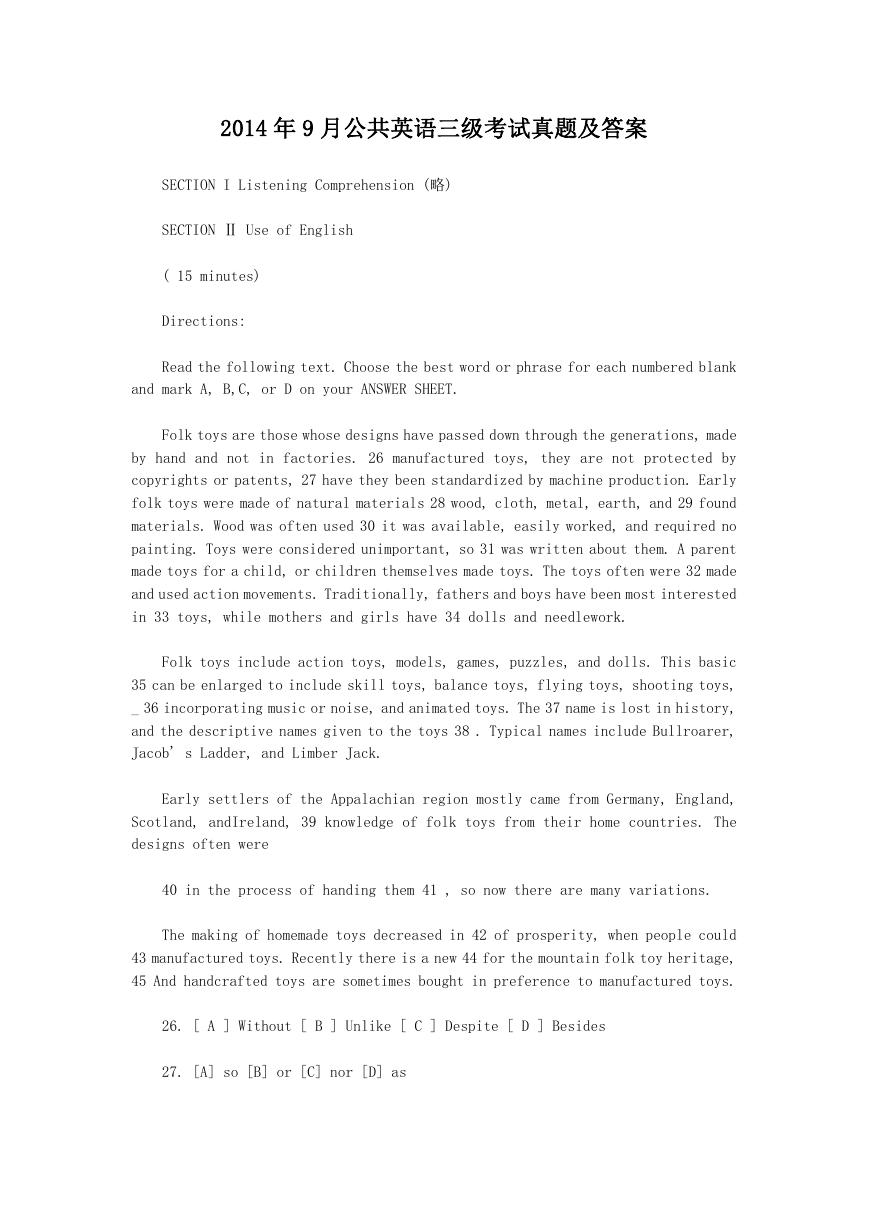
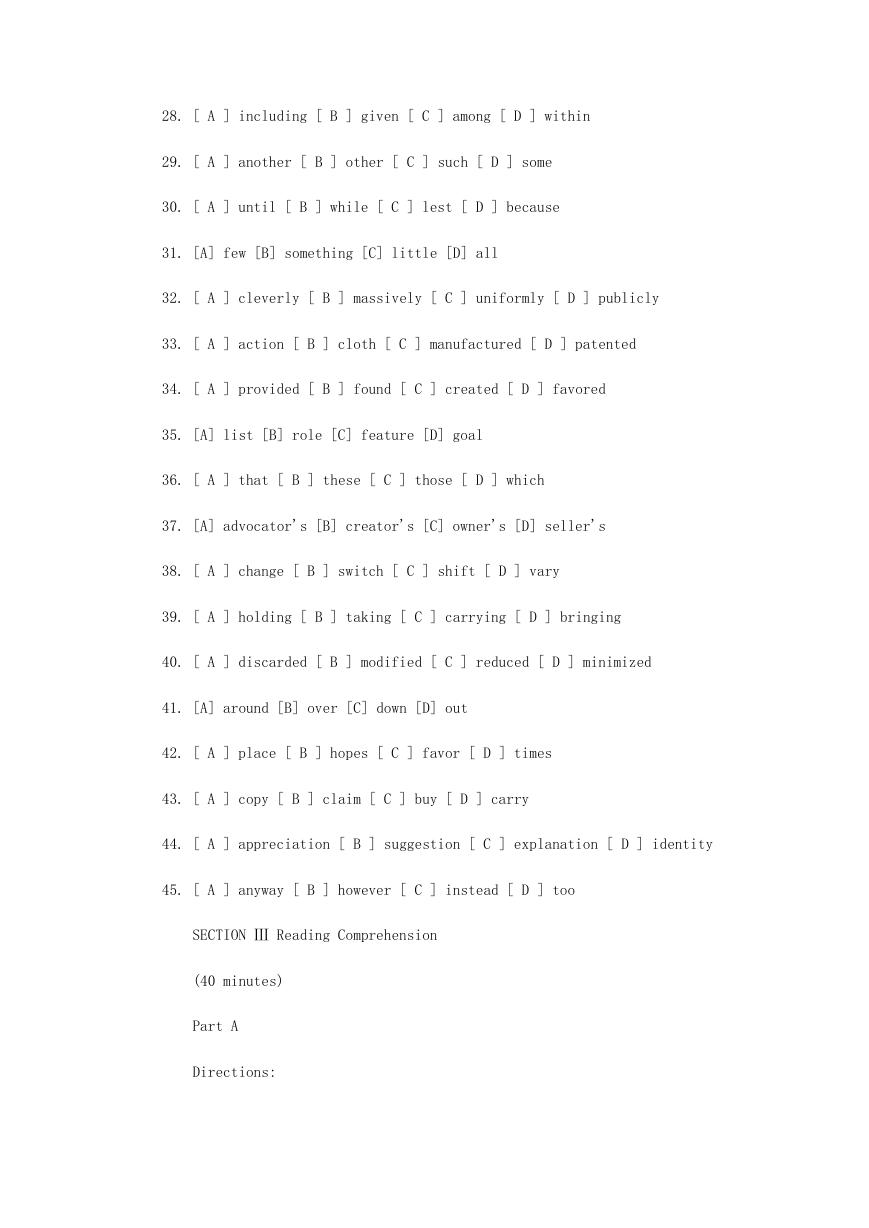

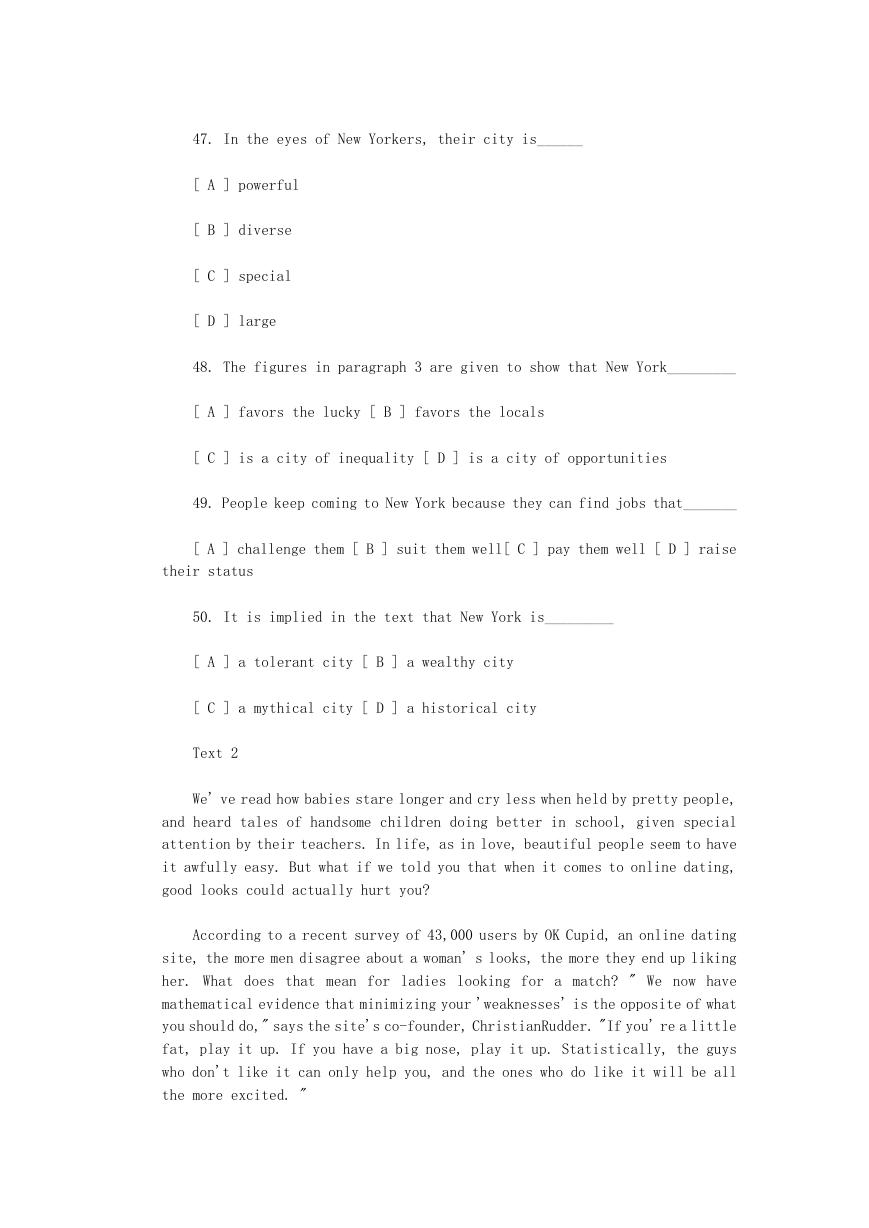
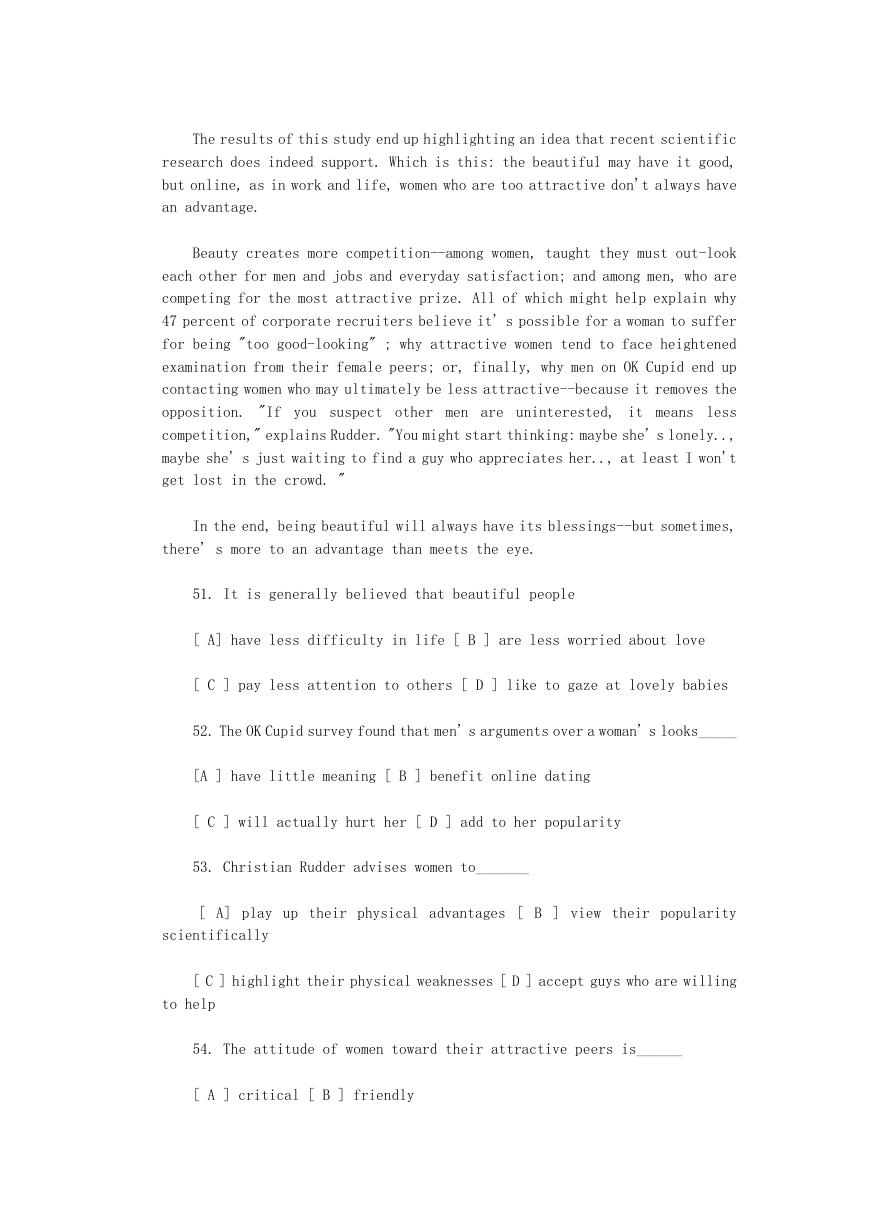
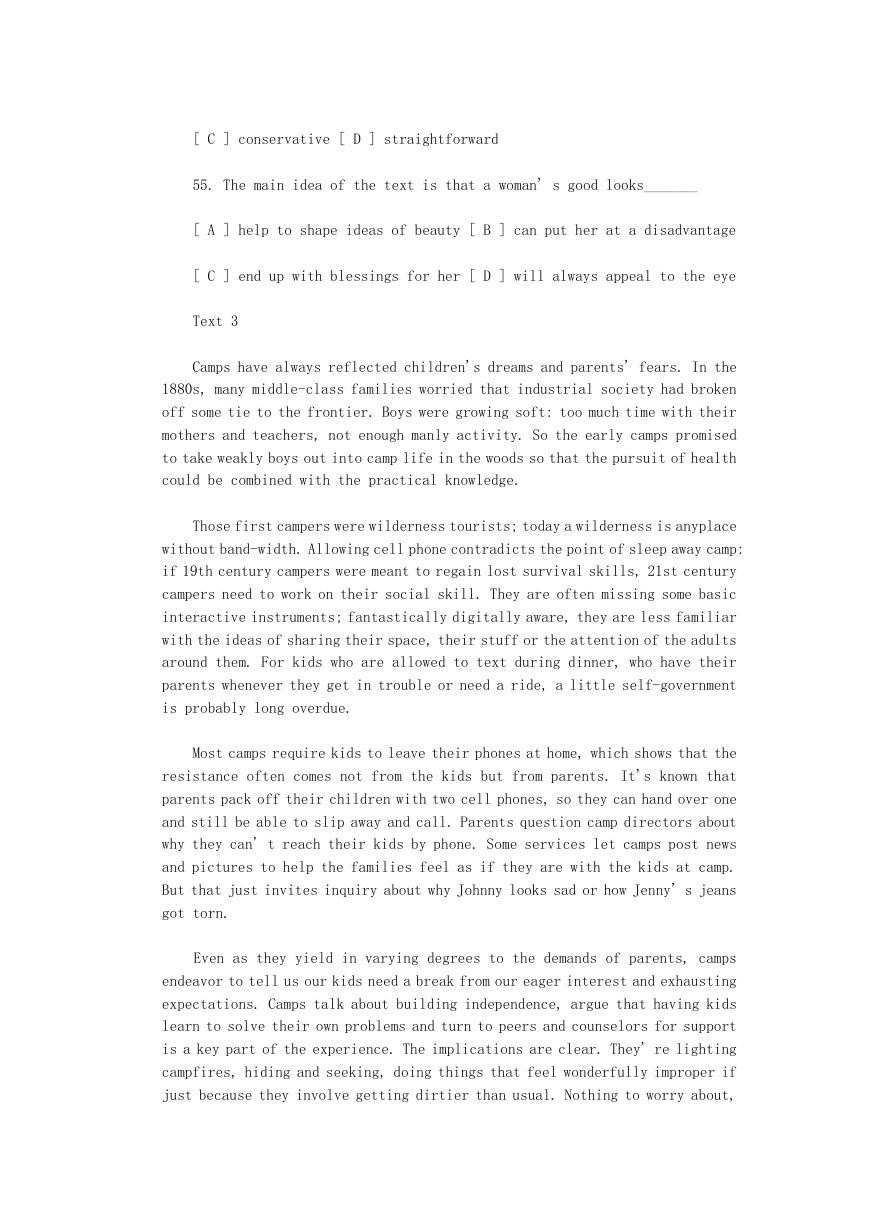
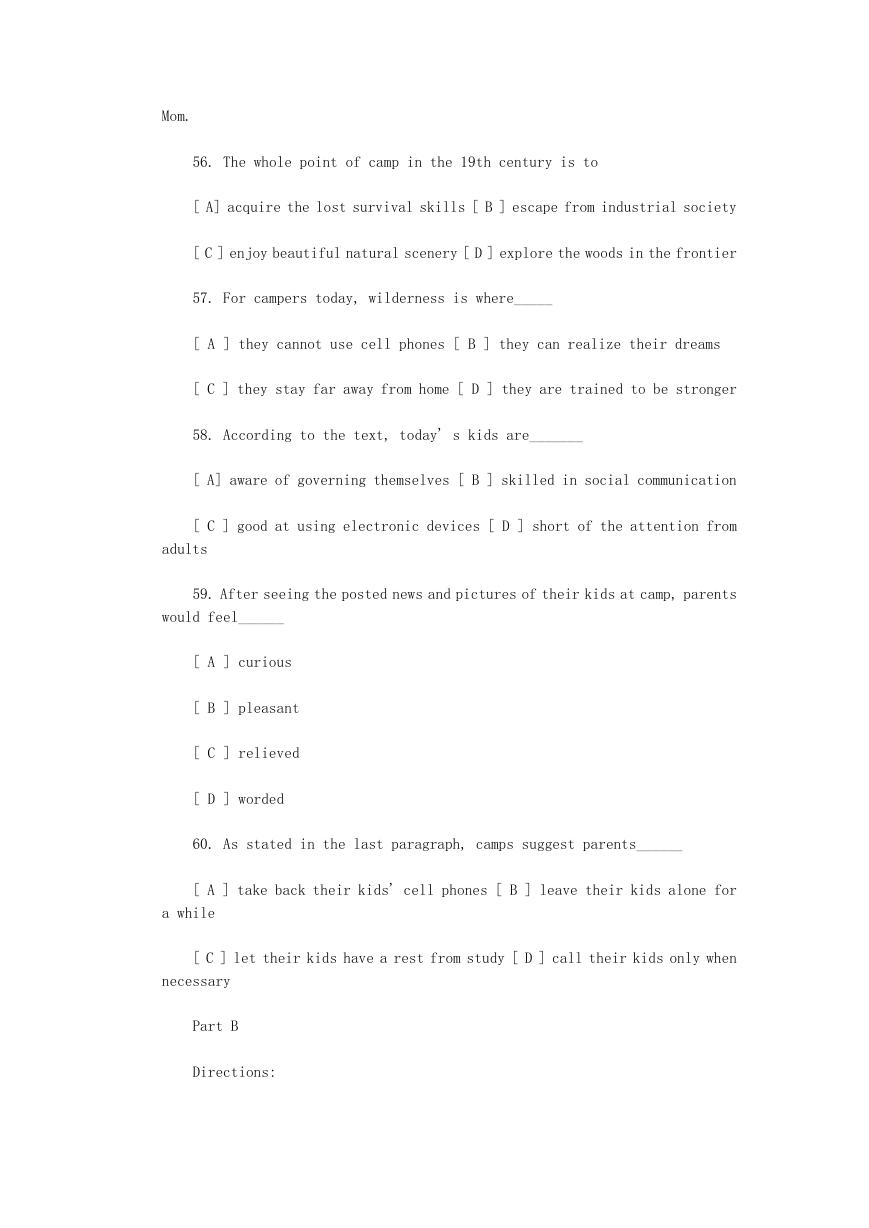
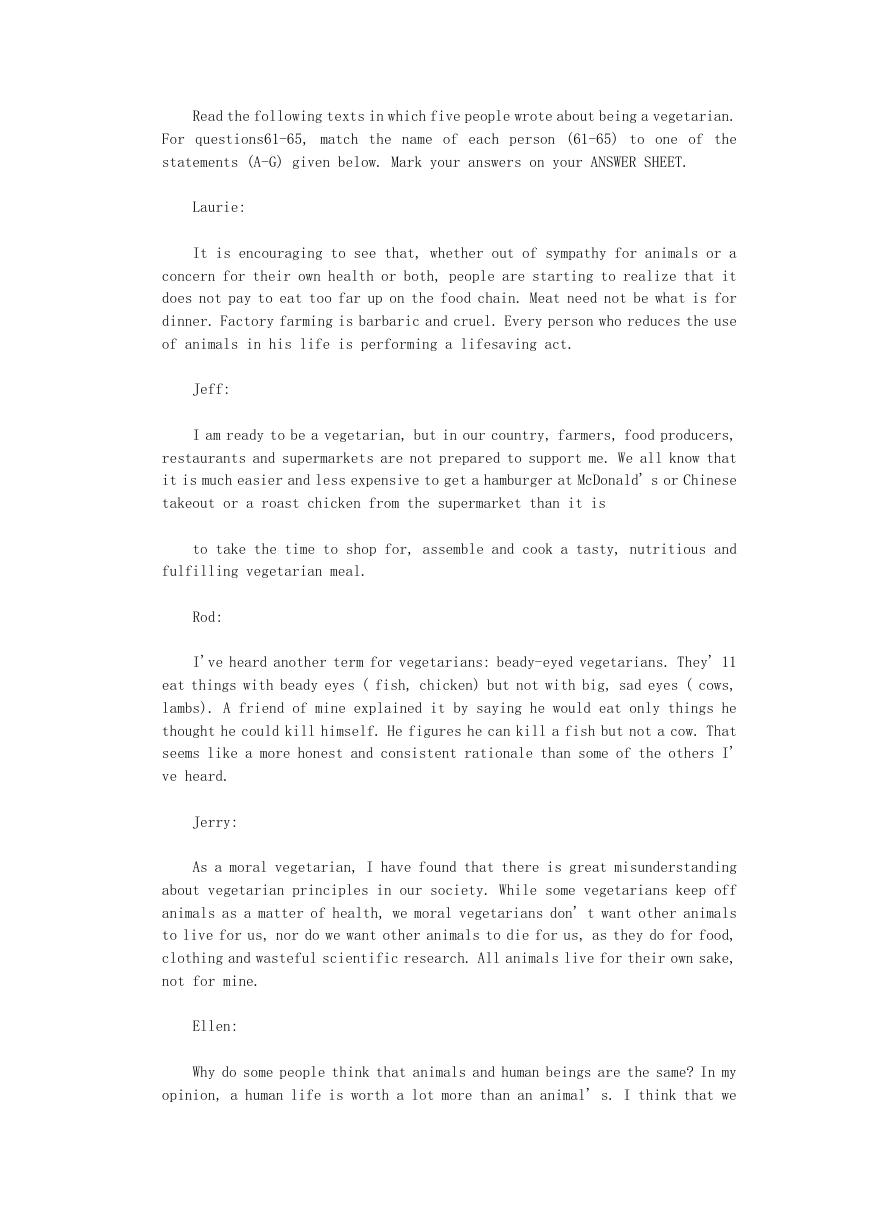








 2023年江西萍乡中考道德与法治真题及答案.doc
2023年江西萍乡中考道德与法治真题及答案.doc 2012年重庆南川中考生物真题及答案.doc
2012年重庆南川中考生物真题及答案.doc 2013年江西师范大学地理学综合及文艺理论基础考研真题.doc
2013年江西师范大学地理学综合及文艺理论基础考研真题.doc 2020年四川甘孜小升初语文真题及答案I卷.doc
2020年四川甘孜小升初语文真题及答案I卷.doc 2020年注册岩土工程师专业基础考试真题及答案.doc
2020年注册岩土工程师专业基础考试真题及答案.doc 2023-2024学年福建省厦门市九年级上学期数学月考试题及答案.doc
2023-2024学年福建省厦门市九年级上学期数学月考试题及答案.doc 2021-2022学年辽宁省沈阳市大东区九年级上学期语文期末试题及答案.doc
2021-2022学年辽宁省沈阳市大东区九年级上学期语文期末试题及答案.doc 2022-2023学年北京东城区初三第一学期物理期末试卷及答案.doc
2022-2023学年北京东城区初三第一学期物理期末试卷及答案.doc 2018上半年江西教师资格初中地理学科知识与教学能力真题及答案.doc
2018上半年江西教师资格初中地理学科知识与教学能力真题及答案.doc 2012年河北国家公务员申论考试真题及答案-省级.doc
2012年河北国家公务员申论考试真题及答案-省级.doc 2020-2021学年江苏省扬州市江都区邵樊片九年级上学期数学第一次质量检测试题及答案.doc
2020-2021学年江苏省扬州市江都区邵樊片九年级上学期数学第一次质量检测试题及答案.doc 2022下半年黑龙江教师资格证中学综合素质真题及答案.doc
2022下半年黑龙江教师资格证中学综合素质真题及答案.doc